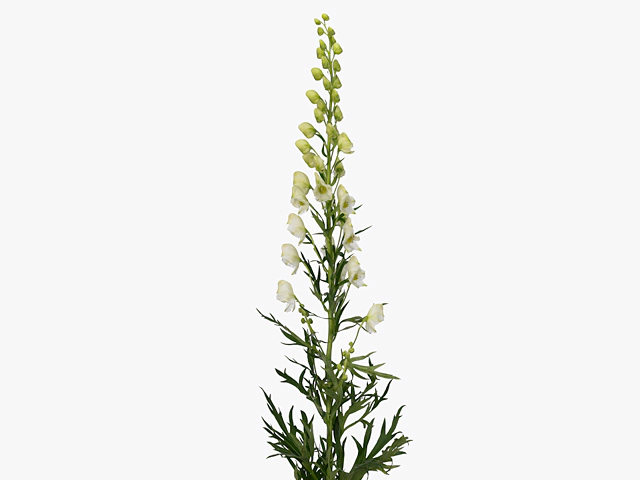Aconitum napellus 'Album'

| Flower type | Single |
| Leaf margin | Serrate; Lobed |
| Flower scent | Unscented |
| Winter hardness | Excellent (USDA-zone 1,2,3,4) |
| Flower color | White-white-155C |
| Flower diameter | 2 - 2,5 cm |
| Flower length/hight | 3,5 - 4 cm |
| Inflorescence | Raceme |
| Leaf size | 10 - 15 cm |
| Light conditions | Semi-shades; Sunny |
| Leaf division | Digitate-lobed |
| Flower color distribution | Unicolored |
| Toxicity (if consumed) | Highly toxic |
| Moisture requirements | Moist |
| Soil type | Humus rich |
The Aconitum napellus 'Album', commonly known as Monkshood, is a stunning flower that belongs to the buttercup family. With its single, white flowers and serrated, lobed leaves, this perennial plant adds a touch of elegance to any garden.
One notable characteristic of the Aconitum napellus 'Album' is its unscented flowers. While many flowers rely on their fragrance to attract pollinators, this variety captivates them with its delicate beauty instead. The flower color of this particular Monkshood is described as white-white-155C, which refers to a pure, snowy white hue.
The flowers of the Aconitum napellus 'Album' measure between 2 and 2.5 centimeters in diameter and can reach a height of 3.5 to 4 centimeters. They appear in racemes, which means they are grouped together on a long, branched stem. The inflorescence, or the overall arrangement of the flowers on the stem, creates a breathtaking display.
To complement the stunning blooms, the leaves of the Aconitum napellus 'Album' are digitate-lobed, meaning they have multiple lobes that resemble the shape of fingers on a hand. These leaves typically reach a size of 10 to 15 centimeters, providing a beautiful backdrop for the flowers.
In terms of cultivation, the Aconitum napellus 'Album' thrives in semi-shaded to sunny locations. It is known for its excellent winter hardness, making it suitable for USDA hardiness zones 1, 2, 3, and 4. This means that it can withstand the cold temperatures and harsh conditions typically found in these regions.
While Monkshood is a highly toxic plant if consumed, its toxicity is also what makes it deer-resistant. This can be an advantage for those looking to protect their garden from unwanted wildlife. However, caution should be exercised around children and pets, as ingestion of any part of the plant can be extremely dangerous.
The Aconitum napellus 'Album' prefers moist soil, making it ideal for gardens with good drainage but regular watering. It thrives in humus-rich soil, which provides the necessary nutrients for healthy growth and vibrant flowers.
In conclusion, the Aconitum napellus 'Album' is a captivating addition to any garden. From its white, unscented flowers to its lobed leaves and excellent winter hardiness, this Monkshood variety is a true beauty. While it may be highly toxic if consumed, its breathtaking display and ability to withstand varying light conditions and moisture requirements make it a popular choice for garden enthusiasts.
Market availability index by month:
| Jan. | Feb. | Mar. | Apr. | May | Jun. | Jul. | Aug. | Sep. | Oct. | Nov. | Dec. |
|---|---|---|---|---|---|---|---|---|---|---|---|
| - | - | - | - | 2 | 4 | 3 | 1 | 1 | - | - | - |